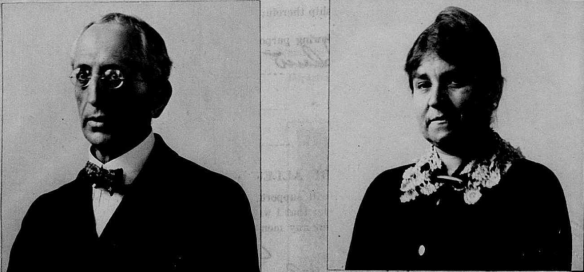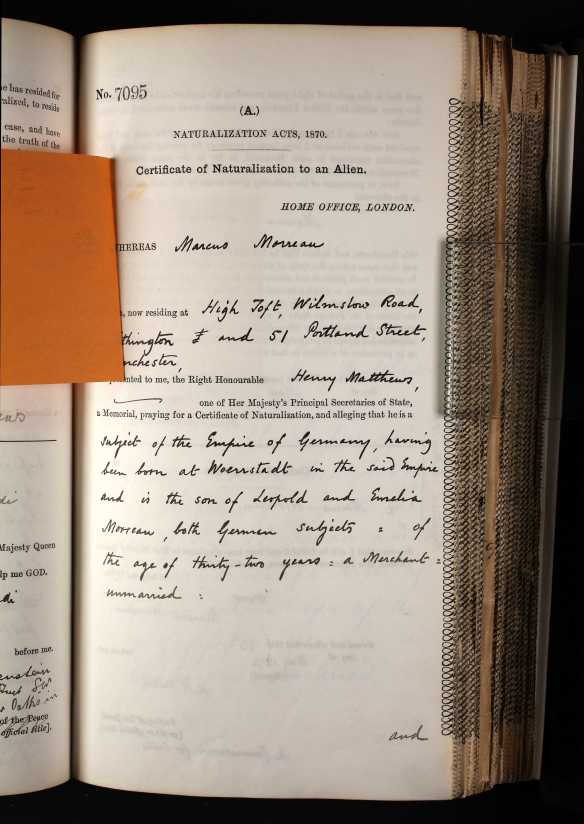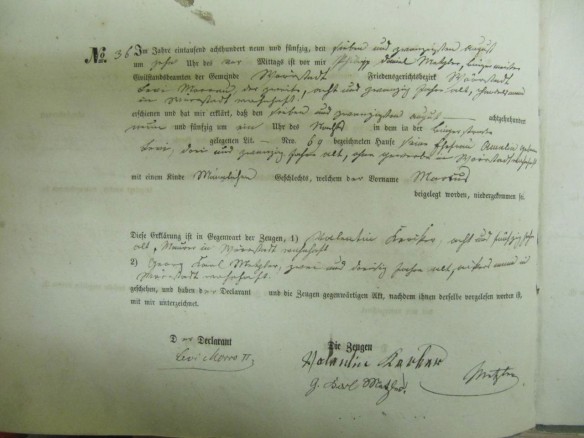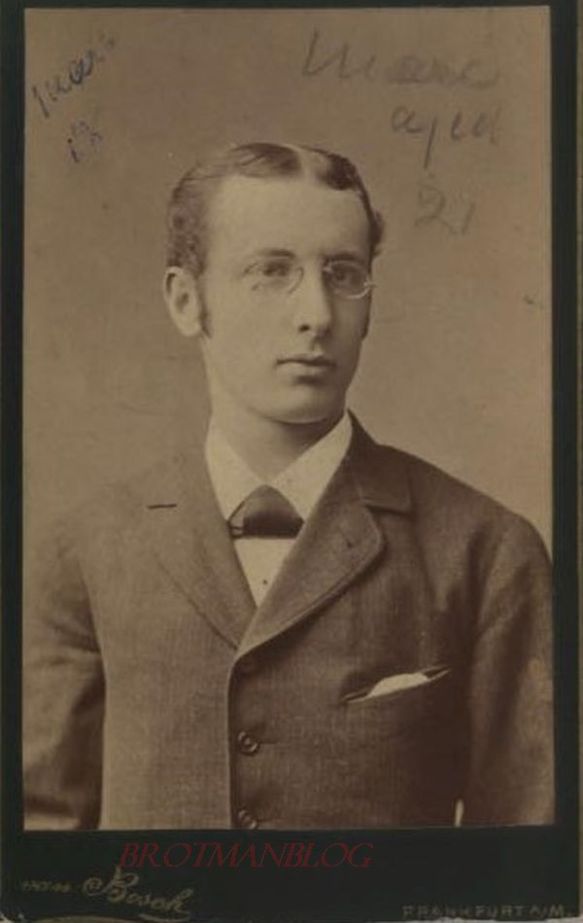When we were in London, I was very fortunate to meet two of my Seligmann cousins, Annette Morreau, my fourth cousin, once removed, and Mark Morreau, my fifth cousin; I wrote about our meeting here. Since then, Mark and I have stayed in touch and shared some of our research into our shared family.
Before I delve into what I’ve learned from Mark, let me first explain how we are connected. Mark and I are both descended from our four-times great-grandparents Jacob Seligmann and Martha Mayer, Mark through their daughter Caroline, me through their son Moritz, my third great-grandfather.
Caroline Seligmann married Moses Morreau on October 8, 1830 in Worrstadt, Germany:

Marriage record of Caroline Seligmann and Moses Morreau October 8, 1930
Worrstadt Marriage Record, 1830-10
They had two children, Levi (1831) and Klara (1838), about whom I wrote here. Levi Morreau married Emilia Levi and had five children, including Markus, who was born in Worrstadt on August 27, 1859:
Here is a photograph of Emilia Levi Morreau, the mother of Markus Morreau:
Markus married Alice Weinmann, and they had three children all born in England. Their first child Cecil, Mark’s grandfather, was born in April, 1905.1 Cecil married Cicely Josephine O’Flanagan in 1933 in Manchester, England,2 and they had three children, including Mark’s father Patrick, born in 1934.3
When I met Mark, his father Patrick was scheduled for surgery within a few weeks after our meeting on June 1, 2019. Patrick made it through the surgery, but then unexpectedly died not long afterwards on June 30, 2019. He was 85. I was heartbroken for Mark and his family and very sad that I had missed the opportunity to meet Patrick myself, especially after Mark shared some of his stories with me. I am grateful, however, to have met Mark and also our cousin Annette, and very glad that Mark was able to share with Patrick some of what we had discussed and to ask a few more questions about the family history.
So in memory of and in honor of Patrick Morreau, let me tell some of that history and those stories.
I will start with Mark’s great-grandfather Markus Morreau. As mentioned above, Markus was one of five children of Levi and Emilia (Levi) Morreau. He had four younger siblings: Albert, Adolf (who died as a child), Bertha, and Alice. I’ve written about them all here and here. In fact, my discovery of the Morreau cousins really started when my cousin Shyanne Morreau found my blog and we together put the various pieces together. Shyanne is descended from Albert Morreau, who left Germany for the United States in 1883 when he was 22 and settled in Cleveland. Albert’s older brother Markus also left Germany as a young man and was living in Withington, a suburb of Manchester, England in 1881; by then he had adopted the more English spelling of his name, Marcus. 4
Here is a photograph of Marcus taken in 1880 when he was 21. It appears it was taken in Frankfurt, either before he emigrated to England or during a visit back to Germany:
I don’t have a photograph of Albert as a young man, but this photo from his 1915 passport with his wife Leonora shows the family resemblance:

“United States Passport Applications, 1795-1925,” database with images, FamilySearch (https://familysearch.org/ark:/61903/1:1:QVJP-423K : 4 September 2015), Albert Morreau, 1915; citing Passport Application, Ohio, United States, source certificate #49162, Passport Applications, January 2, 1906 – March 31, 1925, 234, NARA microfilm publications M1490 and M1372 (Washington D.C.: National Archives and Records Administration, n.d.); FHL microfilm 1,514,173.
Marcus was living in Manchester when he became a naturalized British citizen in 1892.

UK Naturalization Certificate for Marcus Morreau
The National Archives; Kew, Surrey, England; Duplicate Certificates of Naturalisation, Declarations of British Nationality, and Declarations of Alienage; Class: HO 334; Piece: 19
Two of the questions that Mark and I had were why Marcus and Albert left Germany in the 1870s and 1880s and why one went to England and the other to America. As for the first part of that question, the answer seems answered in part by what was happening in Germany in the 1870s and 1880s. According to several sources, Germany was substantially affected by the worldwide depression that began in 1873. Britannica.com reports that:
The prices for agricultural and industrial goods fell precipitously; for six successive years the net national product declined. A sharp decline in profits and investment opportunities persisted until the mid-1890s. About 20 percent of the recently founded corporations went bankrupt.
In agriculture, the deeply indebted Junker elite now faced severe competition as surplus American and Russian grain flooded the German market. Among the more immediate consequences of the crash was a burst of emigration from the depressed provinces of rural Prussia. During the 1870s some 600,000 people departed for North and South America; this number more than doubled in the 1880s.
Lynn Abrams, a scholar writing about this same period, noted that one of the other consequences of the depression of 1873 was an increase in anti-Semitism:5
The Depression, which did not recede until 1879, had profound consequences. The period beginning in 1873 saw the organization of economic interest groups, nationalism of a rather chauvinistic nature, militarism and modern anti-semitism.The Depression caused the landed and industrial interests to mobilize behind the policy of protective tariffs in order to retain their economic and political base. Thus, they succeeded in maintaining their power and the political status quo.
Ironically, the unification of Germany under Bismarck in 1871 led to some increased rights for Jews, but also increased anti-Semitism, as the Center for Israel Education described on its website:
In July 1869, Prussian King Wilhelm I promulgated the North German Confederation Constitution, which gave Jews civil and political rights in twenty-two German states. This Constitution was adopted by the new German empire upon its establishment on April 14, 1871. On April 22, 1871, the Jews in all of Germany were finally given emancipation when the Constitution was extended to Bavaria.
The process of Jewish emancipation led to many changes in both Jewish and non-Jewish society. Some Jews continued religious identification with non-Orthodox Judaism, seeking to remain Jewish but more like their Christian peers; some converted to Christianity because the Emancipation of 1871 still prevented Jews from gaining access to certain high profile social positions; others simply assimilated. Emancipation also led to new and more virulent forms of anti-Semitism, a term that was coined in 1879 in a pamphlet by Wilhelm Marr. Marr became the father of virulent racial anti-Semitism, singling out Jews as inferior because of their racial impurity.
Another website, Jewish History Online, further elaborated on the increased anti-Semitism that occurred in the 1870s and thereafter:
With the onset of the economic crisis of the early 1870s known as “Gründerkrach”, the atmosphere in the newly founded German Kaiserreich started to change. Reich Chancellor Bismarck reacted with a protectionist economic policy and changed his political course to join the conservative camp. As supporters of liberalism and Social Democracy, the Jews now found themselves on the side of the political enemy. They were accused of being responsible for the economic crisis and the ever more pressing “social question.”
There were thus multiple reasons why Marcus and Albert Morreau would have left Germany during this time period—to seek better economic opportunities and to escape anti-Semitism.
As for why one went to England and the other America, we can only speculate. Perhaps they were hedging their bets as to which country would give them more opportunities. Maybe they didn’t get along and wanted to put an ocean between them. Or maybe they each just found a specific job opportunity that led them to settle in two different countries.
More to come…
-
Inferred County: Lancashire, Volume: 8c, Page: 718, Source Information
FreeBMD. England & Wales, Civil Registration Birth Index, 1837-1915 ↩ -
Inferred County: Lancashire, Spouse: O’flanagan, Volume Number: 8d
Page Number: 648, General Register Office; United Kingdom; Volume: 8d; Page: 648,
Ancestry.com. England & Wales, Civil Registration Marriage Index, 1916-2005 ↩ - Registration district: Watford, Inferred County: Hertfordshire, Mother’s Maiden Name: O’Flanagan, Volume Number: 3a, Page Number: 1485, General Register Office; United Kingdom; Reference: Volume 3a, Page 1485, Ancestry.com. England & Wales, Civil Registration Birth Index, 1916-2007 ↩
- Marcus Morreau, 1881 England Census, Class: RG11; Piece: 3892; Folio: 79; Page: 37; GSU roll: 1341930, Enumeration District: 12a, Ancestry.com and The Church of Jesus Christ of Latter-day Saints. ↩
- Lynn Abrams, Bismarck and The German Empire 1871-1918 ( Routledge, 1995), found at https://pdfs.semanticscholar.org/3c20/c71ec7760438fd5651738e40dea8a81a8c19.pdf ↩





Amie, this is a most interesting post on the origin of antisemitism and the great depression in Imperial Germany in the 1870s. I would like to add that often when a country suffers from economic troubles or undergoes a national crisis its citizens are often trying to blame a minority group for its woes. In this particular case, the Jews must have been an easy scapegoat.
LikeLiked by 1 person
You are right, Peter. I think that is why there is so much anti-immigrant fervor now in some many countries. There always has to be a scapegoat.
LikeLiked by 1 person
Outstanding post with so much information. As you know, I too am trying to understand and figure out why 1 brother left Romania for America and the other left for England. It’s all speculation at this point 🙂
LikeLiked by 1 person
Yep, something we can never know for sure. Thanks, Sharon.
LikeLike
I hope the brothers were seeking the best opportunities and not actually wanting to put an ocean between them. Great period research, Amy.
LikeLiked by 1 person
I hope so, also. It did seem that at least the sisters stayed in touch with both brothers, but I did not find any future contact between Marcus and Alfred.
LikeLiked by 1 person
One branch of my family left the Bingen area in the latter part of the 19th century. Apparently a huge percentage of Budesheim I left at that time. I think it was the same reason but also I’ve read that in Germany at that time there were very few opportunities as everything was mandated from above.
LikeLiked by 1 person
And anti-Semitism was not a factor there, right? Just economics.
LikeLiked by 1 person
Right. It was a prime time for emigration from Germany.
LikeLiked by 1 person
Hi Amy, a very interesting post and condolences to the Morreau family. My ancestor’s left Germany between 1870-1873. Some went to America, and the one’s who couldn’t afford the passage there stayed in the UK. I was told one or two came to the UK to “avoid the draft” in Germany, although I’m not sure that’s wholly accurate.
LikeLiked by 1 person
That’s interesting, Shirley. I never thought of England being the cheaper alternative to the US. I wonder if that was a factor for Marcus. Thanks!
LikeLike
Pingback: A Brickwall: When and Where did Alice Weinmann Marry Marcus Morreau? | Brotmanblog: A Family Journey
Interesting that Emelia Levi married Levi Morreau – that should have made for some interesting discussions. I’m sorry you weren’t able to meet Patrick but glad you have made the connection with your cousins.
LikeLiked by 1 person
So am I, Debi. And yes, those Levi/Levy people just pop up everywhere!
LikeLike
I like the way you introduce everyone and prepare the reader for the next installment.
LikeLiked by 1 person
Thanks, Emily.
LikeLike
Hi Amy
Your research of your family has really enthralled me. I am the grandson of Estelle Weinmann, sister to Alice. I remember Auntie Alice very well. Keep up the fascinating research.
LikeLiked by 1 person
Thank you so much, Christopher. I know you and Mark were working on sorting out some of the family mysteries—it takes a village!
LikeLike